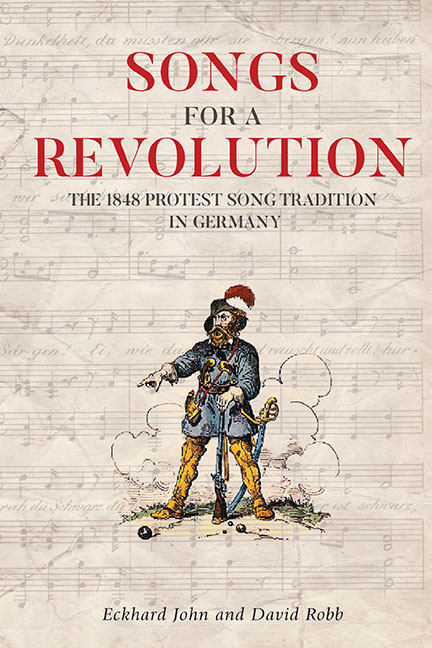Book contents
- Frontmatter
- Contents
- Preface
- Introduction: The Emergence of Political Song 1830–48
- Part I Before 1848: The Vormärz
- Part II 1848–49
- Part III 1848 in Memory
- Conclusion: The Making of Tradition; The Protest Songs of 1848 in the German Folk Revival 303
- Bibliography
- Discography
- Index of Names and Terms
- Index of Song Titles
3 - “Sah ein Fürst ein Büchlein stehn” (“Freiheits-Büchlein”)
Published online by Cambridge University Press: 23 October 2020
- Frontmatter
- Contents
- Preface
- Introduction: The Emergence of Political Song 1830–48
- Part I Before 1848: The Vormärz
- Part II 1848–49
- Part III 1848 in Memory
- Conclusion: The Making of Tradition; The Protest Songs of 1848 in the German Folk Revival 303
- Bibliography
- Discography
- Index of Names and Terms
- Index of Song Titles
Summary
THE POEM “Sah ein Fürst ein Büchlein stehn” (A Prince Saw a Little Book) was written as a parody of Goethe's “Sah ein Knab ein Röslein stehn” (Saw a Boy a Little Rose) by the Hamburg lawyer Leberecht Dreves. Published in 1843, the text functions as a satire of literary censorship in the Vormärz. There is scant evidence that it played any significant role as a song in the nineteenth century. It was rediscovered in the folksong revival of the 1970s and 1980s in the wake of the renewed interest in songs of the 1848 Revolution.
At the time of the poem's origin, Leberecht Blücher Dreves (1816– 70) was working as a lawyer in Hamburg, where he also ran the Neue Hamburger Blätter (New Hamburg Papers) from 1842–43. “Sah ein Fürst ein Büchlein stehn” was written in 1838 and first appeared anonymously in Dreves's collection Lieder eines Hanseaten (Songs of a Hanseater), which was published by August Prinz in Wesel in 1843. A Hamburg police file from the same year verifies Dreves's authorship and tells the story of how the volume was censored: after its publication in March 1843, Prinz was banished from Hamburg, and bookshops in the city were threatened with a fine of 25 Taler if they sold the book. As well as this, the printer Heinrich Gottfried Voigt, and the Altona district censor, judicial officer Brodersen, became targets of a police investigation, which was dropped on May 12, 1843 due to insufficient evidence.
The first line of “Sah ein Fürst ein Büchlein stehn” is an undisguised parody of Goethe's famous poem “Sah ein Knab ein Röslein stehn.” The title “Freiheits-Büchlein” (Little Book of Freedom) contains a further direct literary allusion to the theme of censorship: in 1805 Jean Paul had written his Freiheits-Büchlein, in which he pleaded vigorously for the free exchange of ideas in books and the press without interference from the State or Church. Taking up Jean Paul's point in his poem, Leberecht Dreves mocks the counter-productivity of censorship. The verses relate the story of a “Büchlein” that is banned after it is discovered in a bookshop by a prince who reads it “mit tausend Schrecken” (with absolute horror).
- Type
- Chapter
- Information
- Songs for a RevolutionThe 1848 Protest Song Tradition in Germany, pp. 56 - 63Publisher: Boydell & BrewerPrint publication year: 2020

